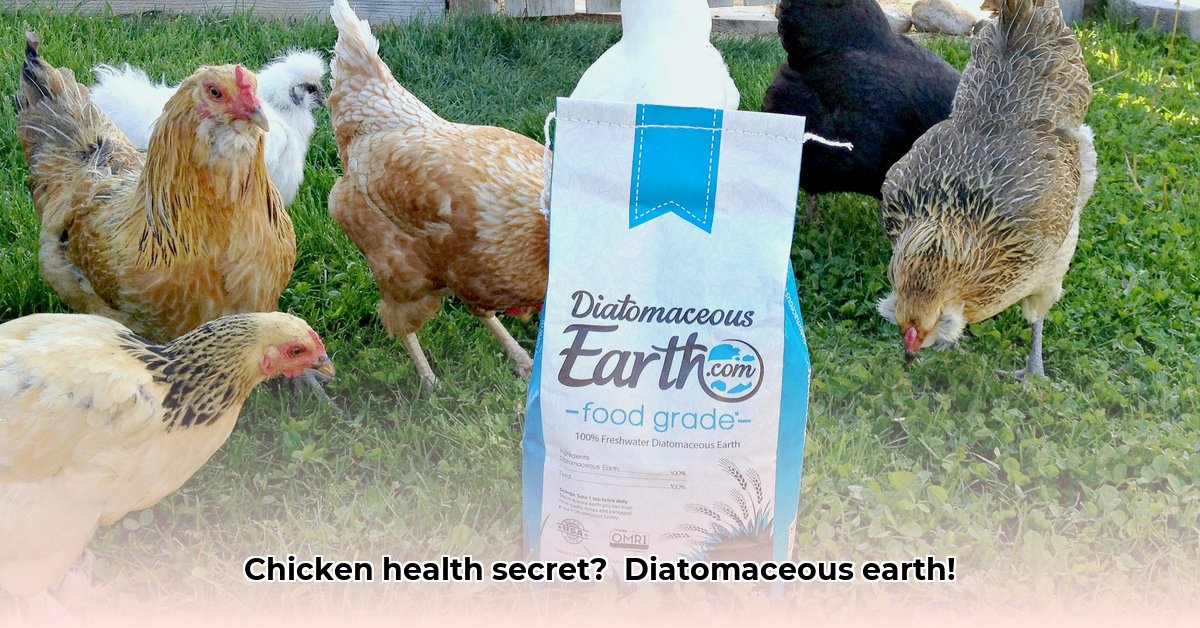
Diatomaceous earth (DE) (a naturally occurring sedimentary rock) is a popular and effective method for controlling parasites in chickens. This guide will show you how to use DE from Tractor Supply to keep your flock healthy and thriving. Are you ready to create a healthier environment for your chickens? Let's dive in! For more information on finding DE, check out this helpful resource: Tractor Supply options.
Understanding Diatomaceous Earth for Chickens
Diatomaceous earth is made up of fossilized diatoms (single-celled algae). These fossilized remains are incredibly porous, creating a structure that is effective at absorbing moisture. This is key to its use in pest control, as it dehydrates parasites like mites, lice, and fleas. It's important to note that food-grade DE is crucial for use around your chickens; avoid using pool-grade DE, which may contain harmful chemicals.
How Diatomaceous Earth Works
DE works by physically damaging the exoskeletons of parasites. The microscopic particles absorb the parasites' oils and moisture, leading to dehydration and death. It is not a poison; DE works through purely physical means. Don't expect immediate results; consistent use is key to control infestations. How long does it usually take to see substantial improvements in your chicken's health after starting DE treatment?
Choosing the Right Diatomaceous Earth
Always choose food-grade diatomaceous earth specifically labeled for use around animals. Tractor Supply carries a variety of options. Reading product labels carefully is essential to confirm it's safe for your chickens.
Using Diatomaceous Earth in Your Chicken Coop
Here's a step-by-step guide on how to effectively use DE to protect your flock:
Prepare the Coop: Thoroughly clean your coop and run, removing any visible debris and droppings. This creates a cleaner base for the DE to work on. This is crucial for optimal effectiveness; a clean coop provides the best environment for DE to function.
Apply the DE: Generously dust all surfaces, including roosting bars, nesting boxes, and the floor of the coop and run. A light dusting isn't enough; a thick layer is needed to ensure thorough coverage. How much DE should you use per square foot? The manufacturer's instructions are a good guide.
Regular Application: Reapply DE every 1-2 weeks, or more frequently if needed, especially after cleaning or if there is heavy moisture. Consistent application maintains efficacy. How often you need to reapply will depend on factors such as coop size and climate.
Safe Handling: Always wear a dust mask when applying DE to prevent inhalation, as inhaling fine DE particles can irritate the lungs. Protect yourself and your birds by following safety guidelines.
Monitor Your Chickens: Observe your chickens for any signs of improvement or continued pest problems. Adjust your application frequency as needed, based on your observations.
Benefits of Using Diatomaceous Earth
Natural and Safe (when using food-grade DE): DE is a natural product and poses no toxicity risk to your chickens when used correctly. It's a good alternative to chemical pesticides.
Effective against Multiple Pests: DE controls a wide range of parasites, including mites, lice, and fleas, making it a versatile tool for pest management. This broad spectrum control simplifies pest management.
Cost-Effective: DE is generally less expensive than many chemical treatments, making it an economical option for chicken keepers. Cost savings can significantly impact long-term coop management.
Frequently Asked Questions
Is diatomaceous earth safe for chickens? Yes, food-grade diatomaceous earth is safe for chickens when used as directed. Avoid inhaling the dust.
How often should I apply diatomaceous earth? Apply every 1-2 weeks, or more often in humid conditions or after cleaning.
Where can I buy food-grade diatomaceous earth? Tractor Supply and other farm supply stores carry it.
What are the signs of parasites in chickens? Signs include feather loss, pale combs, restlessness, and poor egg production.
Remember, consistent use and proper application are crucial for successful pest control with diatomaceous earth. By following these steps, you can provide a healthier and more comfortable environment for your chickens.